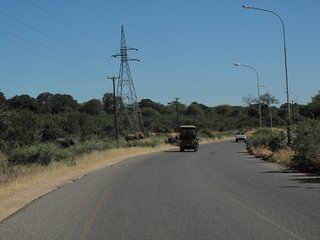Thanks to the generous funding of the Graduate School of Geosciences, I was able to prepare the proposal for my upcoming research on the tourism industry in Tanzania and Namibia. I received funding from January 2018 until April 2018, that is when I started to work as a scientific researcher in Collaborative Research Center CRC 228: “Future Rural Africa: Future-making and social-ecological transformation”. By bridging these months financially , the grant enabled me to conduct literature review, establish contacts to potential research partners, prepare ideas for the methodology and plan a first exploratory field phase in May. In addition to these activities, I made use of GSGS´s extensive workshop offers, e.g. attending classes on Conversational English.
Thus prepared, I could directly start to work on the topic at the start of my contract in April. A first trip to the Zambezi region in Namibia in May gave useful insights in the study site so that the research idea was sharpened. In Namibia, the Growth Corridor cuts a large nature conservation area, leading to a range of conflicts: Human-wildlife conflicts, agricultural intensification vs. conservation. Tourism is seen as a substitute for the loss of income generated from hunting. Whereas the turnover derived from tourism is considerable, it is yet unclear how the value is distributed among the participants of the value chain. In other words, it is important that the value created by tourism stays in the region and is not transferred to other parts of the world.
The conceptual framework of Global Production Networks (GPN) is used to show the degree of value capture in the region. While Global Value Chains perceive global production processes linearly, the GPN approach aims to include the entire spectrum of stakeholders in the analysis. Thus, it facilitates the understanding of economic development against the background of power imbalances, dependencies and dynamic changes. I am looking forward to the upcoming years of interesting research, which will hopefully reveal exiting insights. I am grateful for the support of the GSGS for giving the decisive impulse at the beginning of my research.
Linus Kalvelage, M.Sc.
Department of Geography, University of Cologne
Thesis: Coupling rural Africa through growth corridors? The actual impact of Tourism GPNs on regional development
Supervisor: Prof. Javier Revilla Diez
